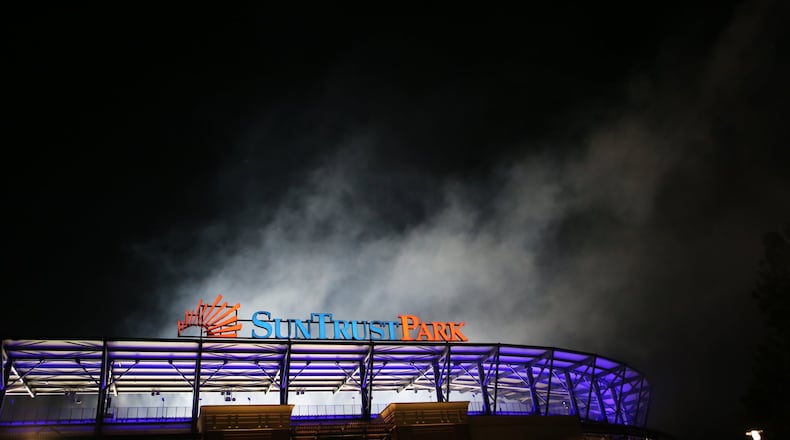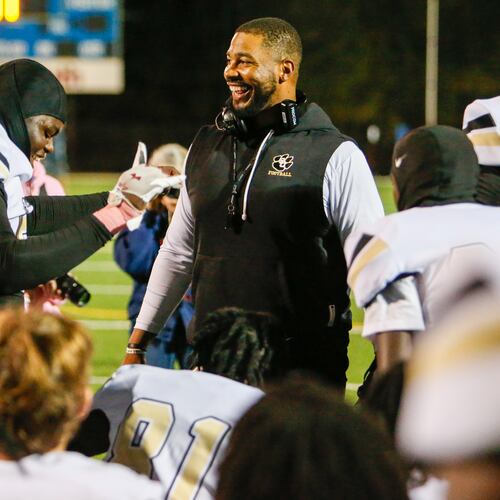Former Cobb County Chairman Tim Lee was fond of calling the decision to build a taxpayer-funded stadium for the Atlanta Braves the “biggest economic development deal in our county’s history.”
In 2015, two years after the deal was approved and one year after his own finance director warned that county spending was quickly overtaking its revenue, Lee issued the following statement:
"Thanks to serious, conservative leadership, Cobb County will realize a 60 percent annual return on investment from the SunTrust Park partnership," he wrote. "In fact, it will be the first private public partnership of its kind to result in a return on investment to taxpayers in the very first year."
Lee, who could not be reached for comment, was voted out, and county officials now say Cobb will be lucky if it breaks even on the project. Although it accounts for only a fraction of the county's budget, the ballpark has become a potent symbol for many of irresponsible spending and skewed priorities. Since the first pitch in April, fees for everything from senior centers to business licenses have gone up. Libraries are in danger of closing, and there's talk of a new penny sales tax to fund the police.
This, despite a record-high tax digest, which may or may not be attributable to the stadium in some areas.
J.C. Bradbury, an economics professor at Kennesaw State University, said the projected economic impact of the stadium was never methodologically sound. More recently, the county has approved employee raises, new parks and large projects with no operating budget.
“It’s not just the Braves,” Bradbury said. “It is an excess expense, but the cost of a lot of things has gone up.”
Today, Cobb is facing a $30 to $55 million budget shortfall after raiding $21 million in rainy-day funds to plug a gaping hole in the 2018 budget.
Notwithstanding Lee’s generous predictions, County Finance Director Bill Volckmann said even though income from the stadium is on track to meet or even exceed expectations, “It’s not going to be a windfall.”
“It’s not going to fix all the county’s problems,” said Volckmann, adding that a property tax increase was likely without steep cuts. “Outside the millage, there’s not a revenue source that would cover the gap.”
Cobb Chairman Mike Boyce, who took office in January after running a campaign that was highly critical of the stadium deal, has sought to walk a fine line between promoting SunTrust Park and appealing to constituents who are still bitter about paying for it. He called the stadium project a "deal too good to be true," but also expressed confidence that the halo effect on development would "eventually" make it revenue neutral.
“Nobody can say if that’s going to happen,” he conceded.
Boyce defended the employee raises and the new parks, both campaign promises. He blamed the bulk of Cobb’s fiscal woes on what he described as years of opaque budgeting, deferred maintenance and unrealistic expectations. Successive tax cuts — including one pushed for by Lee and approved on the eve of his unsuccessful primary runoff against Boyce — further depleted county resources.
The chairman was also keen to point out that about half of the roughly $400 million budget is just for salaries to support departments either mandated by law — courts, elections, tax assessor, sheriff — or deemed essential to county operations, such as code enforcement, transportation, and police.
Boyce said commissioners have already identified millions in efficiencies, but it won’t be enough without new cuts or taxes. He plans to hold a series of town hall-style meetings next year to explain to constituents “the true cost of running this government.”
“Now that we’ve run out of all these buckets to raid, are you willing to pay what it costs to maintain a five-star county?” Boyce said he will ask residents. “What we have to show the taxpayer is have we turned over every single leaf to find every single savings that we can before we’ve asked you for more money.”
The public debt obligation on the stadium amounts to $16.4 million a year. Of that, $6.4 million is paid by Cobb residents out of the county’s general fund, while the remaining $10 million is funded through taxes and fees, including a countywide hotel/motel tax, a countywide rental car tax, a localized Cumberland hotel/motel tax, and localized Cumberland commercial property taxes.
Cobb pays another $1.2 million for stadium operation and maintenance and about $1 million for police overtime and traffic management at games and events.
None of these costs take into account the tens of millions spent on transportation infrastructure that critics say would not have been built but for the Braves. Nor does it account for the cost of the new parks, which were funded with another bond issue after money was diverted to pay for the stadium.
In total, Cobb County is paying a minimum of $8.6 million out of its general fund just for debt service, stadium operations and public safety.
On the revenue side, the Battery commercial project around the stadium has generated about $460,000 in property taxes for the county’s general fund and $1.3 million for schools. Those numbers are expected to rise as the development fills up — it is already at more than 50 percent capacity.
The county declined to give an estimate of sales tax income from the stadium and Battery, but a previous study projected $1.7 million annually. That money goes toward special funds for education and transportation, not the general fund.
The Braves also pay $6.1 million toward the debt service, which has no impact on the county’s obligation.
Economists who study publicly financed stadiums generally find the economic returns do no live up to backers' promises. The Braves and local officials made similarly bold claims in Gwinnett for its Triple-A affiliate that also fell flat.
The Braves said in a statement to The Atlanta Journal Constitution that the team is “proud of the millions of dollars in tax revenue SunTrust Park and The Battery Atlanta has generated for the county and schools.”
“Our 30-year commitment is transforming the Cumberland area of Cobb County and has already been a catalyst for an additional $2 billion of development in the area surrounding the project,” the statement said.
The Cumberland Community Improvement District credits the Braves’ move to Cobb, which coincided with the end of the Great Recession, with spurring rapid economic growth in the area.
For some local Braves fans, having the stadium in their backyard is worth the public investment.
“I love it,” said Pat Eddlemon, a retired teacher from East Cobb who said she’s attended more than a dozen games this year. “I didn’t like going down there (to Turner Field) and there was nothing to do in Atlanta.”
“It creates jobs,” said Paul Brooks of Marietta, a retired software professional.
For others, the stadium is a drain on taxpayer dollars that could go toward things like transportation and public safety.
“It seems like money is raining on Cobb County, but only when it comes to the stadium,” said Guenevere Reed, an activist from South Cobb. “We’ve been duped … all the money that place is getting and we can’t get a bus from Six Flags Drive?”
Allison Mclaughlin, who lives in Mableton and works for a construction company, said she didn’t have strong feelings on the stadium itself but disapproved of some of the costs to taxpayers.
“I don’t think that it’s a good use of police time,” she said. “It seems like the Braves should be paying for that.”
About the Author
Keep Reading
The Latest
Featured



